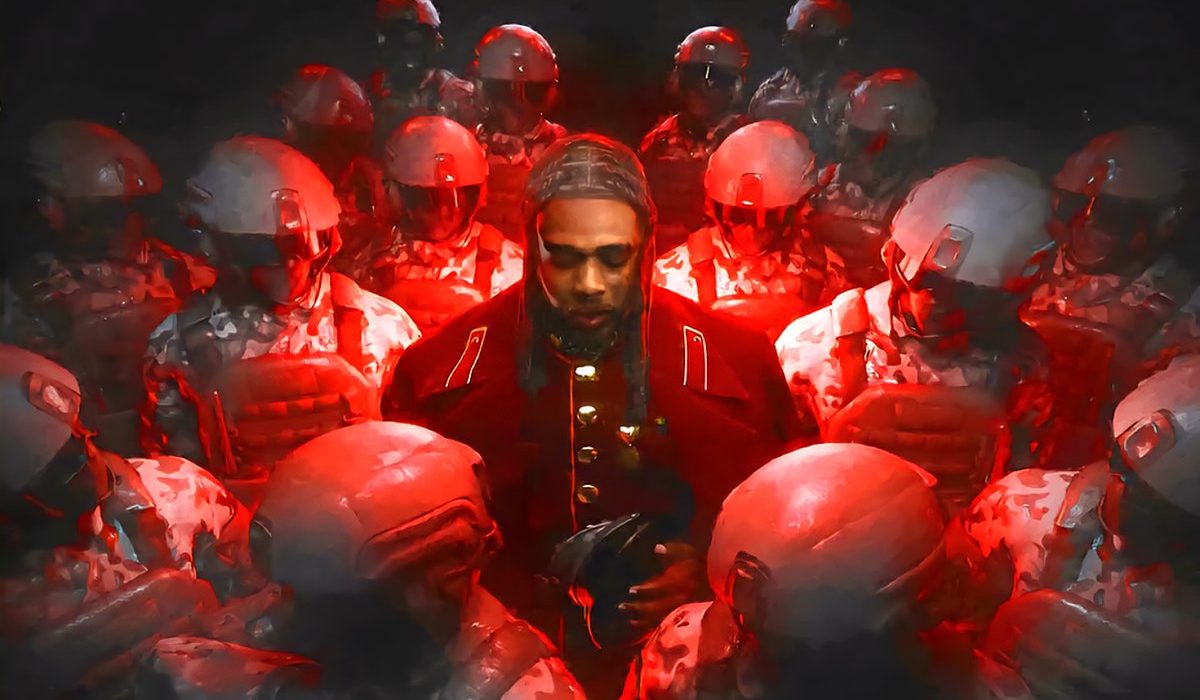Ultimately, Captain doesn’t present a reinvention of BNXN; instead, it leans into what he already does well.
By Abioye Damilare Samson
At the very jump, there was no debating BNXN’s talent. Since his foray into the mainstream music scene in 2021, the dreadlocked artiste has emerged with honeyed vocals and a sharp eye for lyricism, making him a breath of fresh air at the time.
His debut EP, Sorry, I’m Late, served as both an artistic introduction to what he had to offer and an apology for the delay in presenting it. That project confirmed BNXN as a leading voice in a new generation of singer-songwriters poised to splice new life into Afro-Pop’s DNA.
The momentum only grew stronger with his 2022 follow-up EP, Bad Since ’97, where he joined forces with Afro-Pop heavyweights like Wizkid, Wande Coal, and Olamide, which further cemented his place in the industry’s upper echelon.
All of that boldness, self-assurance, and craft now find new expression in the title of his sophomore album, Captain. And truthfully, it’s a tag he’s earned, especially after clinching the highly coveted Next Rated award at the 2022 Headies, in one of the tightest and most competitive categories in recent memory, and the multiple number-one records to his name.
Following the wide acceptance of his semi-eponymous debut album, Sincerely, BNXN, in 2023, and the thrilling collaborative project RnB with Ruger in 2024, it felt only natural for BNXN to return with a new body of work after a steady run of singles. Leading up to the release of his sophomore album, Captain, he had already dropped a handful of tracks, each one making a bold statement in its own right. Among them was the infectious, party-ready “Fi Kan We Kan”, a catchy collaboration with Rema released in October 2024, which proves he’s just as comfortable with club anthems as he is with introspective cuts.
But singles only scratched the surface. The entire stretch of Captain offers a more transparent window into the current state of his artistry. On the intro track, “I Alone”, he leans into vulnerability, singing about the isolation that shadows his rise. The song, which interpolates XXXTentacion’s 2018 track “Moonlight”, opens with the sound of a spark being lit, like someone igniting a blunt, before his voice enters, weary yet melodic: “I feel like I’m all alone, on my own/ Sometimes I dey smile, sometimes I dey bone”, he sings. The collaboration with Seyi Vibez on “Set Up” lacks the chemistry needed to deliver a standout record. While BNXN’s hook tries to salvage the track, Seyi Vibez’s verse, reminiscent of his flow on “Mario Kart” from the Children of Africa EP, feels somewhat out of place.

On the pre-released track “CUTESY”, BNXN taps into early 2000s R&B influences, infusing rich melodies with a laid-back trap beat to serenade his lover, blending flattering admiration with raw, hedonistic desire. His intentions become clearest when he sings: “Can you fuck me like I owe you some amount?/ I wish I could put you in my mouth/ So nobody else can know what you’re about”.
It gets even more thrilling on “JIES”, a track where BNXN leans deeper into his admiration for women. The title is an acronym for the Yoruba phrase “Ju ìdí e sẹ́yìn”, which loosely translates to “shake your bum bum to the back”. There’s also a clever interpolation of Burna Boy’s playful line, “Titi, Lola, ati Folukemi”, from Leriq’s 2015 track “Turn Up” featuring Phyno, which adds a nostalgic touch. The beat arrangement builds on elemental Afrobeat rhythms that give the song a lively, dance-inducing bounce.
He teams up with FOLA on the pre-released “Very Soon” to deliver what is perhaps one of the most melodic romantic love songs on the project, thanks to FOLA’s magnetic hook and the lush guitar strings layered through the song.
There’s a confident dose of braggadocio on the dancehall-inflected “Eleyi”, a track that rewards multiple replays with its bounce and boldness. Even on the mid-tempo, titular track, “CAPTAIN”, BNXN maintains that chest-thumping energy. Over steady drums and a warm guitar bassline, he sings: “While some may hate on my preferences, they cannot deny say / Me I sabi gan, I sabi gan / Been active, I’ve been at this, fun odun meje”. There’s little difference in the beat arrangement between “CAPTAIN” and “Yes Sir”; the only distinction lies in the song’s theme. Where the former brims with self-assuredness, “Yes Sir” is a love song that sees BNXN sing about his muse, Aduke: “Aduke mi, yes sir, I dey trip for your body, yes sir”, he croons.
Moving into the second half of the album, Captain reaches one of its most exhilarating moments on “Laye Mi”, which was released just days before the whole project. Everything about the track is catchy and magnetic, especially BNXN’s use of a deep Yoruba proverb: “Èrò mi tó ńjó, tó ńjó lórí omi,” an abridged version of “Ìròmi tó ńjó lójú omi, onílù rẹ̀ wà nìsàlẹ̀ odò”. The line, which translates as “The water bug dancing on the surface of the stream has its drummer beneath it”, is an ancient saying about unseen support and the steady presence of those who keep you moving even when you appear to be gliding on your own.

On the album’s shortest track, “5hrs Till Nairobi”, which echoes the breezy cadence of “For Days”, BNXN flexes his songwriting instincts over a feel-good groove. The subtle saxophone riffs, appearing almost sporadically, add a warm, jazzy texture that complements the song’s chill vibe.
The sizzling “Phenomena”, released last year, sees him blend his signature Afro-Pop melodies with gentle Amapiano elements to craft an infectious bop. It’s groovy, vocally rich, and showcases his range. Even on “Fi Kan We Kan”, where he teams up with Rema, BNXN keeps things smooth, while Rema’s verse elevates the track with an added jolt of energy.
On the Semzi-produced “Totori”, BNXN interpolates ID Cabasa’s mid-tempo Reggae-Dancehall-inspired song of the same name, gliding over log drum-powered production with effortless ease.
On “Ashimolowo”, where he cheekily revives an old Twitter joke with the line: “No come ask me silly questions like is Ashimolowo a bad bitch?”, delivered over a slow-tempo rhythm laced with lush guitar chords. The mood turns silkier on “Cough Syrup,” a duet with Victony that pairs airy melodies with chest‑thumping boasts; Victony steals the spotlight for a moment, quipping, “Before Yori Yori leave Bracket mouth/ I dey write my songs on a low key/ Abi shey you think say I be novice oh?”.
BNXN closes the record on a reverent note with “In Jesus Name”, enlisting the Soweto Gospel Choir for a rousing finale. Over swelling harmonies, he affirms his daily grind and faith: “See na everyday wey me I dey pray/ Na my daily bread wey me I dey chase/ And I know failure e no go come my way/ ‘Cause na in Jesus name wey me I dey pray”. The choir’s rich, congregational backdrop turns the outro song into a triumphant benediction that seals Captain with hope.
Ultimately, Captain doesn’t present a reinvention of BNXN; instead, it leans into what he already does well. His songwriting remains razor-sharp, and the emotional transparency that has defined his rise still runs through the best parts of the album.

Tracks like “Laye Mi”, “Fi Kan We Kan”, and “Phenomena” highlight his knack for lacing relatable lines and references into groove-heavy records that reward replay. Save for the Seyi Vibez-assisted “Set Up”, where the chemistry falls flat, the album’s features are strong and well-aligned, offering new textures without overshadowing the leading voice.
This sophomore album shows that BNXN continues to blur the lines between R&B and Afro-Pop by folding soul-leaning melodies into productions that range from log-drum bounce to warm Afrobeats sensibilities. However, his signature nasal tone, while instantly recognisable, can sometimes dull the emotional arc of his performances, making a few tracks feel repetitive and monotonous, despite their rhythmic variation.
Still, Captain’s few stumbles—like the moments where his nasal delivery grows too familiar—don’t do enough to weigh the album down. For the most part, BNXN’s latest offering reaffirms his place as one of Afro-Pop’s most consistent melodic stylists. His melodies remain accessible, and his collaborations are sharply curated. It may not break new sonic ground, but Captain proves that BNXN is still a sailor firmly in command of his sound.
Lyricism – 1.5
Tracklisting – 1.0
Sound Engineering – 1.4
Vocalisation – 1.4
Listening Experience – 1.5
Rating – 6.8/10
Abioye Damilare Samson is a music journalist and culture writer focused on the African entertainment Industry. Reading new publications and listening to music are two of his favourite pastimes when he is not writing. Connect with him on Twitter and IG: @Dreyschronicle.



